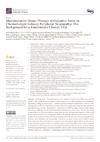Identificador persistente para citar o vincular este elemento:
https://accedacris.ulpgc.es/jspui/handle/10553/106081
| Título: | Modulation by Ozone Therapy of Oxidative Stress in Chemotherapy-Induced Peripheral Neuropathy: The Background for a Randomized Clinical Trial | Autores/as: | Clavo Varas, Bernardino Martínez-Sánchez, Gregorio Rodríguez Esparragón, Francisco Javier Rodríguez Abreu, Delvys Galván, Saray Aguiar-Bujanda, David Díaz-Garrido, Juan A. Cañas Jiménez, Silvia Torres-Mata, Laura B. Fabelo Gómez, Himar Antonio Téllez, Teresa Santana Rodríguez, Norberto Fernández Pérez, Leandro Fco Marrero Callicó, Gustavo Iván |
Clasificación UNESCO: | 32 Ciencias médicas 320711 Neuropatología 230221 Biología molecular |
Palabras clave: | Antioxidants Cancer treatment Chemotherapy-induced peripheral neuropathy Chemotherapy-induced side effects Chemotherapy-induced toxicity, et al. |
Fecha de publicación: | 2021 | Publicación seriada: | International Journal of Molecular Sciences | Resumen: | Background: Chemotherapy-induced peripheral neuropathy (CIPN) decreases the quality of life of patients and can lead to a dose reduction and/or the interruption of chemotherapy treatment, limiting its effectiveness. Potential pathophysiological mechanisms involved in the pathogenesis of CIPN include chronic oxidative stress and subsequent increase in free radicals and proinflammatory cytokines. Approaches for the treatment of CIPN are highly limited in their number and efficacy, although several antioxidant-based therapies have been tried. On the other hand, ozone therapy can induce an adaptive antioxidant and anti-inflammatory response, which could be potentially useful in the management of CIPN. (2) Methods: The aims of this works are: (a) to summarize the potential mechanisms that could induce CIPN by the most relevant drugs (platinum, taxanes, vinca alkaloids, and bortezomib), with particular focus on the role of oxidative stress; (b) to summarize the current situation of prophylactic and treatment approaches; (c) to describe the action mechanisms of ozone therapy to modify oxidative stress and inflammation with its potential repercussions for CIPN; (d) to describe related experimental and clinical reports with ozone therapy in chemo-induced neurologic symptoms and CIPN; and (e) to show the main details about an ongoing focused clinical trial. (3) Results: A wide background relating to the mechanisms of action and a small number of experimental and clinical reports suggest that ozone therapy could be useful to prevent or improve CIPN. (4) Conclusions: Currently, there are no clinically relevant approaches for the prevention and treatment of stablished CIPN. The potential role of ozone therapy in this syndrome merits further research. Randomized controlled trials are ongoing. | URI: | https://accedacris.ulpgc.es/handle/10553/106081 | ISSN: | 1422-0067 | DOI: | 10.3390/ijms22062802 | Fuente: | International Journal of Molecular Sciences[ISSN 1661-6596],v. 22 (6), p. 1-19, (Marzo 2021) |
| Colección: | Artículos |
Citas SCOPUSTM
27
actualizado el 08-jun-2025
Citas de WEB OF SCIENCETM
Citations
32
actualizado el 15-feb-2026
Visitas 5
421
actualizado el 15-ene-2026
Descargas
198
actualizado el 15-ene-2026
Google ScholarTM
Verifica
Altmetric
Comparte
Exporta metadatos
Los elementos en ULPGC accedaCRIS están protegidos por derechos de autor con todos los derechos reservados, a menos que se indique lo contrario.
